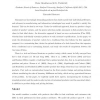Free Online Productivity Tools
i2Speak
i2Symbol
i2OCR
iTex2Img
iWeb2Print
iWeb2Shot
i2Type
iPdf2Split
iPdf2Merge
i2Bopomofo
i2Arabic
i2Style
i2Image
i2PDF
iLatex2Rtf
Sci2ools
MANSCI
2008
2008
Product-Line Competition: Customization vs. Proliferation
Abstract Consumers are increasingly demanding products that closely match their individual preferences, and advances in manufacturing and information technologies have made it possible to satisfy this demand. This can be done in two ways. Under the traditional approach, firms can produce a larger number of product variants, and the greater selection enables consumers to find products that are closer to their ideal choice. An alternative approach is based on mass customization (Pine 1993), whereby firms individually customize products to each customer's specifications. In this paper, we study the determinants of product variety for a traditional firm that follows the first approach; compare it to a customizing firm; derive the optimal decisions of a dual-channel firm that operates both a traditional and a customizing channel; and study the results of competition between the two types of firms. There is a rich and diverse literature on product variety which cannot be fully surveyed ...
| Added | 13 Dec 2010 |
| Updated | 13 Dec 2010 |
| Type | Journal |
| Year | 2008 |
| Where | MANSCI |
| Authors | Haim Mendelson, Ali K. Parlaktürk |
Comments (0)

